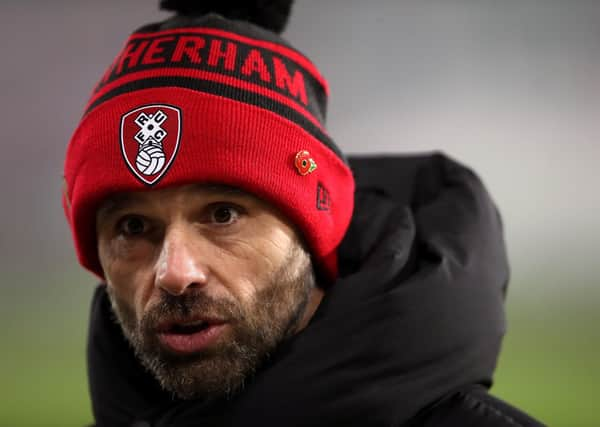Why Rotherham United chief says new benchmark is disrupting transfer plans


The Millers manager is looking to strengthen a squad which has been tested by a tight fixture schedule for a second-half-of-the-season relegation battle, but admits it will be difficult.
Although finances dictate many Football League clubs would probably like to sell or at least offload fringe players amidst the loss of revenue brought about by, in some cases, six months of behind-closed-doors football, the demands of so many games in a shorter-than-usual timeframe plus the threat of Coronavirus infections mean they need more players than at any time in their histories.
Advertisement
Hide AdAdvertisement
Hide AdLast year was the first time Football League sides were allowed to make five substitutions, initially in last season’s restarted Championship, and from mid-November in second, third and fourth-tier games.
The Premier League is resolutely sticking to three but in a compromise move and in deference to the introduction of concussion substitutes, it has followed the Championship in increasing the number of players allowed on the bench to nine.
Championship Rotherham, like top-division Sheffield United, were unable to name a full compliment in their most recent matches.
“Just recently we’ve used virtually every player we have,” said Warne, whose team are one-from-bottom in the Championship, three points from safety. “You don’t really need nine subs. We’re all greedy and want it, but it’s not a necessity.
Advertisement
Hide AdAdvertisement
Hide Ad“Because of the multitude of games through December, a lot of teams have taken a lot of injuries and players who weren’t initially in the 18 (-man match-day squads), now the 20, have crept into the squad and got on the pitch and scored or done well and all of a sudden they’re back in the manager’s plans.
“It’s always the same, we have certain targets, we think we can make happen and the (potential selling) club are considering it and a week down the line you’re watching the scores on a Wednesday night and the staff all text each other saying, ‘oh my God, he’s only starting!’
“Hence why you never get too excited until the window has opened. You can have the best plans laid down and work really hard to get the best targets but slowly but surely they do get chiselled away.
“I just think because of the multitude of games, managers are more reluctant to let some of their players on the periphery go because you’re only ever one calf or hamstring strain away (from being short) and if you get players who aren’t used to training with you, will they be up to speed, will they be physically ready?
Advertisement
Hide AdAdvertisement
Hide Ad“The summer window’s great because you get a large period of time to work with them; this window you need people who can come in and play.
“The fixtures, Covid, the way of the world at the moment and finances play a massive part.
“We’re now taking three team buses to every game (under new Covid-19 protocols). These costs add up so I can imagine it being quite a frugal window compared to previous Januarys.”
The window closes at 11pm on February 1, after which clubs can make no more signings this season.
Rotherham’s home games against Derby County and Cardiff City have been rearranged for February 2 and 9 respectively.
Comment Guidelines
National World encourages reader discussion on our stories. User feedback, insights and back-and-forth exchanges add a rich layer of context to reporting. Please review our Community Guidelines before commenting.